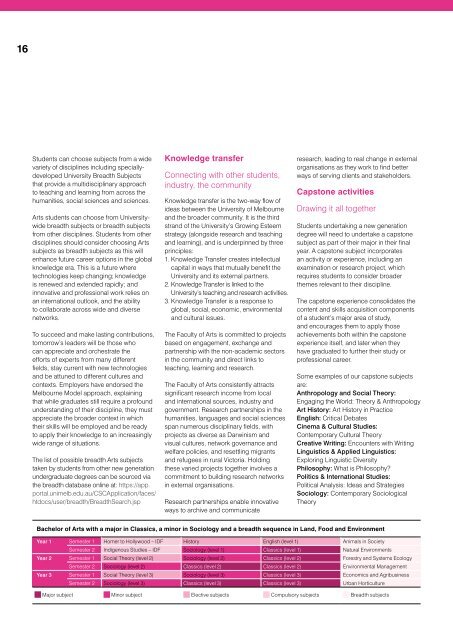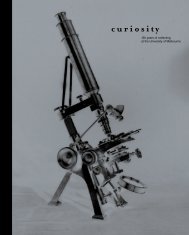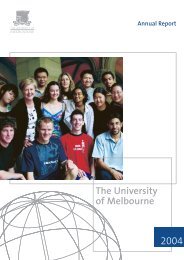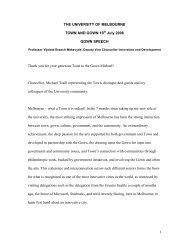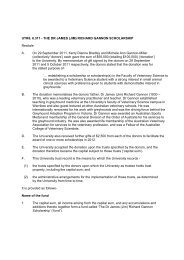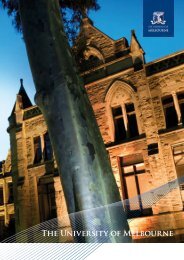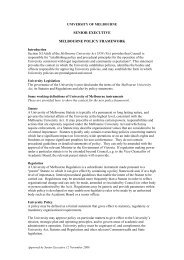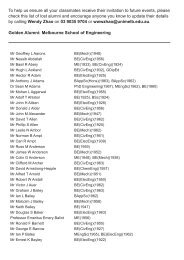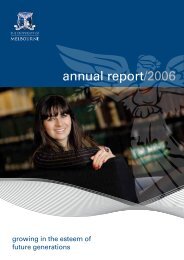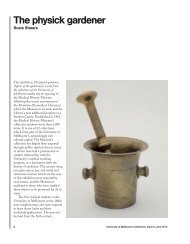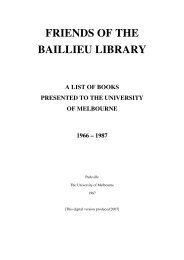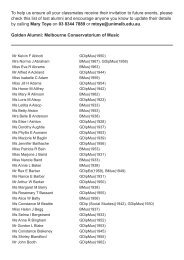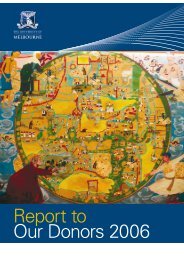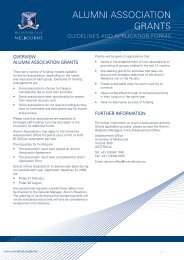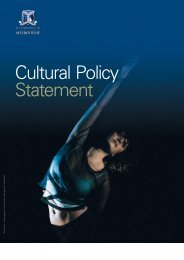2010 International Undergraduate Prospectus nts. u.au
2010 International Undergraduate Prospectus nts. u.au
2010 International Undergraduate Prospectus nts. u.au
Create successful ePaper yourself
Turn your PDF publications into a flip-book with our unique Google optimized e-Paper software.
16<br />
Stude<strong>nts</strong> can choose subjects from a wide<br />
variety of disciplines including speciallydeveloped<br />
University Breadth Subjects<br />
that provide a multidisciplinary approach<br />
to teaching and learning from across the<br />
humanities, social sciences and sciences.<br />
Arts stude<strong>nts</strong> can choose from Universitywide<br />
breadth subjects or breadth subjects<br />
from other disciplines. Stude<strong>nts</strong> from other<br />
disciplines should consider choosing Arts<br />
subjects as breadth subjects as this will<br />
enhance future career options in the global<br />
knowledge era. This is a future where<br />
technologies keep changing; knowledge<br />
is renewed and extended rapidly; and<br />
innovative and professional work relies on<br />
an international outlook, and the ability<br />
to collaborate across wide and diverse<br />
networks.<br />
To succeed and make lasting contributions,<br />
tomorrow’s leaders will be those who<br />
can appreciate and orchestrate the<br />
efforts of experts from many different<br />
fields, stay current with new technologies<br />
and be attuned to different cultures and<br />
contexts. Employers have endorsed the<br />
Melbourne Model approach, explaining<br />
that while graduates still require a profound<br />
understanding of their discipline, they must<br />
appreciate the broader context in which<br />
their skills will be employed and be ready<br />
to apply their knowledge to an increasingly<br />
wide range of situations.<br />
The list of possible breadth Arts subjects<br />
taken by stude<strong>nts</strong> from other new generation<br />
undergraduate degrees can be sourced via<br />
the breadth database online at: https://app.<br />
portal.unimelb.edu.<strong>au</strong>/CSCApplication/faces/<br />
htdocs/user/breadth/BreadthSearch.jsp<br />
Knowledge transfer<br />
Connecting with other stude<strong>nts</strong>,<br />
industry, the community<br />
Knowledge transfer is the two-way flow of<br />
ideas between the University of Melbourne<br />
and the broader community. It is the third<br />
strand of the University’s Growing Esteem<br />
strategy (alongside research and teaching<br />
and learning), and is underpinned by three<br />
principles:<br />
1. Knowledge Transfer creates intellectual<br />
capital in ways that mutually benefit the<br />
University and its external partners.<br />
2. Knowledge Transfer is linked to the<br />
University’s teaching and research activities.<br />
3. Knowledge Transfer is a response to<br />
global, social, economic, environmental<br />
and cultural issues.<br />
The Faculty of Arts is committed to projects<br />
based on engagement, exchange and<br />
partnership with the non-academic sectors<br />
in the community and direct links to<br />
teaching, learning and research.<br />
The Faculty of Arts consistently attracts<br />
significant research income from local<br />
and international sources, industry and<br />
government. Research partnerships in the<br />
humanities, languages and social sciences<br />
span numerous disciplinary fields, with<br />
projects as diverse as Darwinism and<br />
visual cultures, network governance and<br />
welfare policies, and resettling migra<strong>nts</strong><br />
and refugees in rural Victoria. Holding<br />
these varied projects together involves a<br />
commitment to building research networks<br />
in external organisations.<br />
Research partnerships enable innovative<br />
ways to archive and communicate<br />
research, leading to real change in external<br />
organisations as they work to find better<br />
ways of serving clie<strong>nts</strong> and stakeholders.<br />
Capstone activities<br />
Drawing it all together<br />
Stude<strong>nts</strong> undertaking a new generation<br />
degree will need to undertake a capstone<br />
subject as part of their major in their final<br />
year. A capstone subject incorporates<br />
an activity or experience, including an<br />
examination or research project, which<br />
requires stude<strong>nts</strong> to consider broader<br />
themes relevant to their discipline.<br />
The capstone experience consolidates the<br />
content and skills acquisition compone<strong>nts</strong><br />
of a student’s major area of study,<br />
and encourages them to apply those<br />
achieveme<strong>nts</strong> both within the capstone<br />
experience itself, and later when they<br />
have graduated to further their study or<br />
professional career.<br />
Some examples of our capstone subjects<br />
are:<br />
Anthropology and Social Theory:<br />
Engaging the World: Theory & Anthropology<br />
Art History: Art History in Practice<br />
English: Critical Debates<br />
Cinema & Cultural Studies:<br />
Contemporary Cultural Theory<br />
Creative Writing: Encounters with Writing<br />
Linguistics & Applied Linguistics:<br />
Exploring Linguistic Diversity<br />
Philosophy: What is Philosophy?<br />
Politics & <strong>International</strong> Studies:<br />
Political Analysis: Ideas and Strategies<br />
Sociology: Contemporary Sociological<br />
Theory<br />
Bachelor of Arts with a major in Classics, a minor in Sociology and a breadth sequence in Land, Food and Environment<br />
Year 1 Semester 1 Homer to Hollywood – IDF History English (level 1) Animals in Society<br />
Semester 2 Indigenous Studies – IDF Sociology (level 1) Classics (level 1) Natural Environme<strong>nts</strong><br />
Year 2 Semester 1 Social Theory (level 2) Sociology (level 2) Classics (level 2) Forestry and Systems Ecology<br />
Semester 2 Sociology (level 2) Classics (level 2) Classics (level 2) Environmental Management<br />
Year 3 Semester 1 Social Theory (level 3) Sociology (level 3) Classics (level 3) Economics and Agribusiness<br />
Semester 2 Sociology (level 3) Classics (level 3) Classics (level 3) Urban Horticulture<br />
Major subject Minor subject Elective subjects Compulsory subjects Breadth subjects


